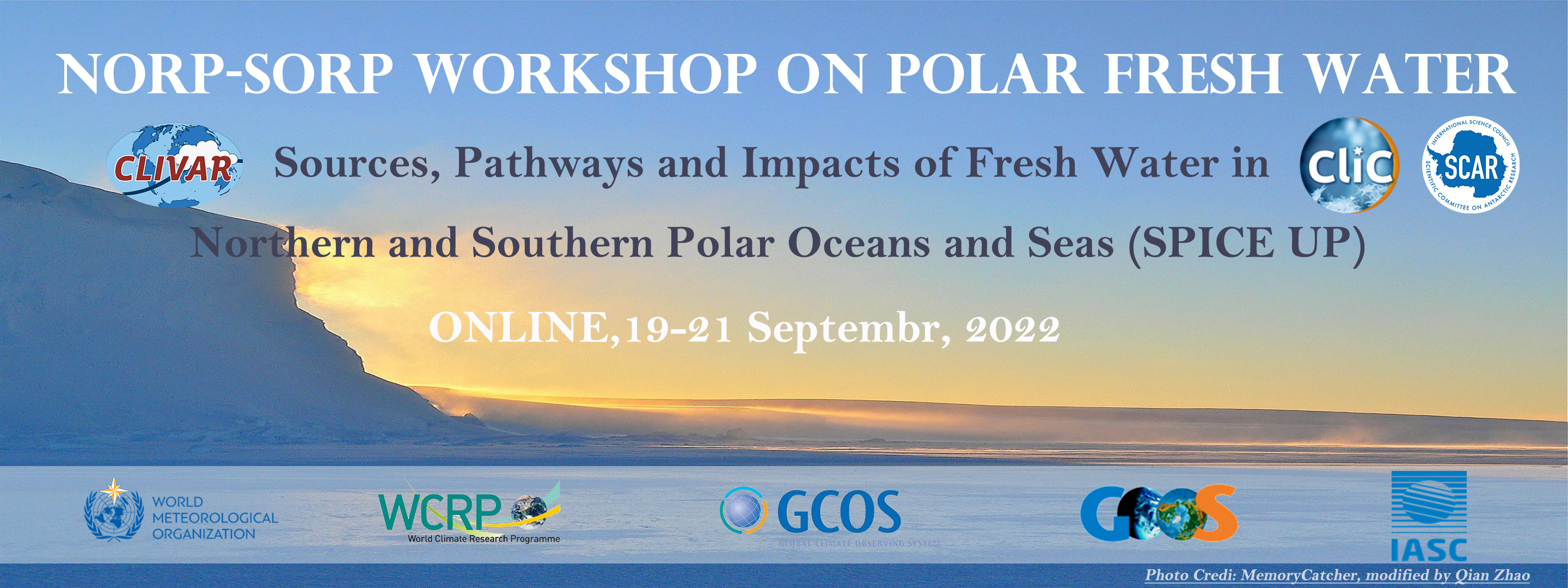SPICE UP Workshop Links Northern and Southern Polar Oceans in A Changing Global Climate

After three days of comprehensive review presentations, productive discussions, and enthusiastic debate, the online NORP-SORP workshop on polar fresh water: Sources, Pathways and ImpaCts of frEsh water in northern and soUthern Polar oceans and seas (SPICE UP) concluded successfully on 21 September 2022.
This workshop was for the first time to bring together bipolar ocean communities to work on outstanding scientific questions about freshwater cycle and its roles. It featured three keynotes of speakers with expertise on both the Arctic and Southern Oceans, seven topical discussion sessions consisting of small breakout rooms, three summary discussions and a wrap-up. The workshop took us on a journey addressing the specific topics from sources and sinks of polar fresh water to changes in ocean structure and circulation, and polar-global linkages. The participants and organizers were motivated by the exceptionally well-prepared keynote talks and vigorously engaged thoughtful discussions.
More than 140 registrants from several continents participated at varying times, making it a challenge to organize this workshop across time zones. To welcome colleagues from all places, the workshop offered discussion sessions at various times and recordings of the keynote and summary sessions. Results of breakout discussions were collected in shared documents editable by every participant. The clear structure of the workshop also provided people with the option to participate during their favorite topic.
In preparation of the workshop, the organizers solicited discussion topics during registration for the event. These suggestions were summarized into 3-4 key questions posed for each discussion theme, which the participants discussed and expanded on during the breakout sessions. The breakout discussions were scheduled after each keynote, when the participants were able to express their perspective on the respective theme. In conclusion, this yielded an excellent overview of the current state of research of the sources, pathways and impacts of fresh water in the Arctic and the Southern Ocean, as well as their linkages, similarities, and common challenges, which are summarized as follows:
- Even in a future warming ocean, stratification in both north and south polar oceans is likely to be governed mainly by salinity, albeit local thermal effects could be important; Southern Ocean less strongly stratified.
- True for north and south? Local processes on the (sub-)mesoscale and smaller are responsible for FW dispersion and export, but most of those processes and associated features, such as boundary currents, are not resolved in 1deg-resolution climate models.
- Bathymetry not always well known, can influence local processes.
- Jointly plan observational and modelling efforts: focus (profiles, bathymetry, other coverage, process focus…).
- Pathways of FW vary depending on release depth.
- What’s the role of tracers and drifters to observationally follow FW to lower latitudes (e.g. CFC)?
- The “pesky” reference salinity discussion is not yet over…
The workshop received great feedback by the participants. Summary slides, final report and other materials of the workshop will be provided on its Webpage.














Add new comment